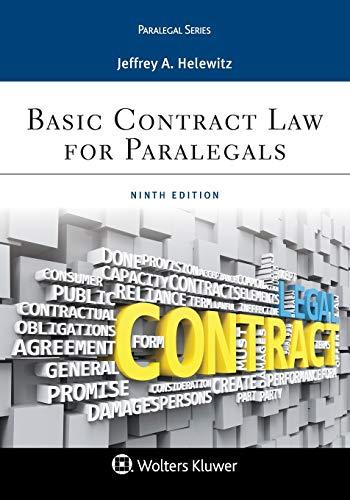This is a breach-of-contract case in which appellant Phil Watkins, P.C. challenges a summary judgment based on
Question:
This is a breach-of-contract case in which appellant Phil Watkins, P.C.
challenges a summary judgment based on the trial court’s determination that a one-page letter agreement between Phil Watkins, P.C. and appellee The Krist Law Firm, P.C. was supported by consideration and is unambiguous.
Although we find the agreement was supported by consideration, we hold that it is ambiguous and so reverse the trial court’s judgment, and remand this case for further proceedings consistent with this opinion.
I. Factual and Procedural Background At issue in this breach-of-contract dispute is the extent, if any, to which Krist can recover attorneys’ fees and expenses based on its representation of two former clients subsequently represented by Watkins. Krist represented Kinley Sorrells, Sides, Inc., and other plaintiffs in a lawsuit filed against E.I.
DuPont de Nemours & Company, alleging damages to their pecan orchards caused by the Benlate 50 DF (R) fungicide manufactured by DuPont (hereafter, the “DuPont Suit”). Krist claims that, while acting on behalf of these clients, it reached a settlement agreement with DuPont under which each plaintiff would receive $200 per affected acre owned by the clients plus an amount to be calculated under a “most-favored-nations provision.” Krist asserts that, under this most-favored-nations provision, Kinley Sorrells and Sides, Inc. (collectively, the “Clients”) would have received an additional amount equal to the difference, if any, between the $200 paid and the average per acre value paid by DuPont in the highest 25% of pre-verdict settlements that DuPont paid between the date on which the Clients signed their releases and December 31, 2000, in pecan cases in Texas alleging damage from Benlate (R).
Krist claims that the Clients initially consented to this settlement but then discharged Krist without just cause and without Krist relinquishing its right to reimbursement of expenses plus a 40% fee interest in the Clients’ claims.
Watkins asserts that the Clients discharged Krist for just cause and that the Clients never consented to any proposed settlement negotiated by Krist.
Watkins claims that the Clients assured Watkins they did not owe any obligation to Krist and that Krist had told them to get another lawyer if they did not like the settlement proposed by Krist. In any event, after the Clients approached Watkins about representing them in their claims against DuPont, Watkins asked Krist if the Clients had any financial obligation to Krist. After communications with Kevin Krist, a lawyer employed by the Krist firm, Watkins received the letter dated November 22, 1999, which forms the entire basis for the contract claim in this case. The body of this letter reads in its entirety:
Thank you for your correspondence of October 12, 1999 relative to Kinley Sorrells and the Sides. [sic] We certainly don’t have any problem with you assuming representation of these parties since they have discharged us. Nevertheless, they did discharge us in the context of us having reached a settlement agreement with DuPont to which they initially consented. Our suggestion is as follows: if the cases are resolved by your firm in such a fashion as to allow for a recovery on their behalf when none would have existed under the terms of our proposed agreement, then we will forfeit all of our fees and expenses. On the other hand, if circumstances are such that our proposed settlement agreement would have resulted in the same or greater recovery than you eventually achieve, then we would insist upon a full fee and reimbursement of expenses.
Please let me have your thoughts on this as soon as possible as the judge is pressing for substitution of new counsel in order to keep the matter from stagnating on his docket.
Kevin Krist testified that Phil Watkins expressed agreement to these terms during a telephone conversation. Furthermore, Phil Watkins later wrote to the Krist firm, “I will not forget the agreement in your letter of November 22, 1999.” Watkins substituted in the DuPont Suit as new counsel for the Clients and arranged for these claims to be litigated in the counties where the respective orchards are located. Watkins eventually obtained settlements for the Clients in an amount greater than the Clients would have obtained under the settlement proposed by Krist. When Watkins refused to pay Krist its fees and expenses, Krist sued Watkins and the Clients.
Krist alleged a variety of claims against Watkins and the Clients, and all defendants filed motions to transfer venue. Watkins did not set its venue motion for hearing or obtain a ruling on it. Meanwhile, Krist moved for partial summary judgment alleging that the one-page letter agreement was unambiguous and that, under its terms, Krist was entitled to recover from Watkins $544,411 plus attorneys’ fees. The trial court granted summary judgment as to liability and damages on Krist’s contract claim but denied the motion as to attorneys’ fees. After Krist nonsuited its other claims against Watkins and all its claims against the Clients, and after Krist asked for a final judgment that awarded no attorneys’ fees, the trial court signed a final judgment awarding Krist $544,411 plus post judgment interest............
Questions
1. What is the ambiguity in the contract that the court discusses?
2. According to the court, what is the primary concern of the courts in interpreting contracts?
Step by Step Answer:






